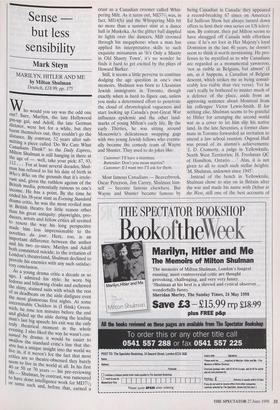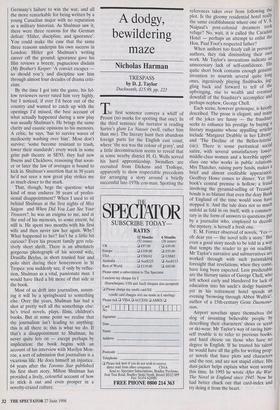Sense but less sensibility
Mark Steyn
MARILYN, HITLER AND ME by Milton Shulman Deutsch, £18.99, pp. 375 Who would you say was the odd one out? Sure, Marilyn, the late Hollywood pin-up gal, and Adolf, the late German dictator, were hot for a while, but they burnt themselves out, they couldn't go the distance. By contrast, 52 years after sub- mitting a piece called `Do We Care What Canadians Think?' to the Daily Express, Milton Shulman is still hanging in there at the age of — well, take your pick: 87, 93, 112 . . . For at least several decades, Shul- man has refused to list his date of birth in Who's Who on the grounds that it's irrele- vant and, given the ruthless ageism of the British media, potentially ruinous to one's income. He has a point. By the time he ended his 38-year stint as Evening Standard drama critic, he was the most reviled man in British theatre for little reason other than his great antiquity: playwrights, pro- ducers, actors and fellow critics all seemed to resent the way his long perspective made him less impressionable to the novelties du jour. Here, too, is an important difference between the author and his two co-stars: Marilyn and Adolf both committed suicide; to the irritation of London's theatreland, Shulman declined to provide his enemies with any such satisfac- tory conclusion. As a young drama critic a decade or so ago, I admired his style: he wore big fedoras and billowing cloaks and eschewed the shiny, stained suits with which the rest of us deadbeats on the aisle disfigure even the most glamorous first nights. At some interminable Chekhov in (I think) Green- wich, he rose ten minutes before the end and glided up the aisle during the leading man's last big speech: his exit was the only truly theatrical moment in the whole evening. I also liked the way he wasn't con- sumed by drama: it would be easier to swallow the standard critic's line that the- atre has a unique insight into the world we live in, if it weren't for the fact that most critics are so theatre-obsessed they barely seem to live in the world at all. In his first 40 or 50 or 70 years — his pre-reviewing life — Shulman, by contrast, was rumoured to have done intelligence work for MI371/2 or some such and, before that, earned a crust as a Canadian crooner called Whis- pering Milt. As it turns out, MI371/2 was, in fact, MI14(b) and the Whispering Milt bit no more than a summer stint at a dance hall in Muskoka. As the glitter ball dappled its lights over the dancers, Milt crooned through his megaphone: when a man has applied his interpretative skills to such exquisite miniatures as 'It's Only a Shanty in Old Shanty Town', it's no wonder he finds it hard to get excited by the plays of Howard Barker.
Still, it seems a little perverse to continue dodging the age question in one's own memoirs. Shulman was born to Ukrainian Jewish immigrants in Toronto, though exactly when is hard to figure out, unless you make a determined effort to penetrate the cloud of chronological vagueness and start looking up Canada's post-Great War influenza epidemic and the other land- marks of young Milton's early life. By the early Thirties, he was sitting around Moscowitz's delicatessen swapping gags with two young Jewish fellows who eventu- ally became the comedy team of Wayne and Shuster. They used to do jokes like:
Customer: I'll have a martinus. Bartender: Don't you mean martini? Customer: If I want two I'll ask for them.
Most famous Canadians — Beaverbrook, Oscar Peterson, Jim Carrey, Shulman him- self — become famous elsewhere. But Wayne and Shuster became famous by being Canadian in Canada: they appeared a record-breaking 67 times on America's Ed Sullivan Show but always turned down offers to host their own series on US televi- sion. By contrast, their pal Milton seems to have shrugged off Canada with effortless ease: if he's set foot in Her Majesty's loyal Dominion in the last 40 years, he doesn't seem to think it worth mentioning. He pro- fesses to be mystified as to why Canadians are regarded as a monumental yawneroo, `not as risible as Belgians, but almost' (I am, as it happens, a Canadian of Belgian descent, which strikes me as being consid- erably less risible than vice versa). Yet he can't really be bothered to muster much of a defence of the place, aside from an approving sentence about Montreal from his colleague Victor Lewis-Smith. If for nothing else, Shulman seems to be grateful to Hitler for arranging the second world war as a cover to let him slip his native land. In the late Seventies, a former class- mate in Toronto forwarded an invitation to attend a law school reunion. Osgood Hall was proud of its alumni's achievements: `J. D. Cromerty, a judge in Yellowknife, North West Territories; H. Freshman QC of Hamilton, Ontario... ' Alas, it is not given to all to reach such stellar heights: `M. Shulman, unknown since 1945'.
Instead of the bench in Yellowknife, Shulman chose to stay on in Britain after the war and made his name with Defeat in the West, still one of the best accounts of Germany's failure to win the war, and all the more remarkable for being written by a young Canadian major with no reputation as a military historian. As Shulman saw it, there were three reasons for the German defeat: 'Hitler, discipline, and ignorance'. You could make the case that the same three reasons underpin his own success in London: Hitler got Shulman's writing career off the ground; ignorance gave his film reviews a breezy, pugnacious disdain (My Brother's Keeper: 'A convict escapes so should you'); and discipline saw him through almost four decades of drama criti- cism.
By the time I got into the game, his fel- low reviewers never rated him very highly, but I noticed, if ever I'd been out of the country and wanted to catch up with the openings I'd missed, the best account of what actually happened during a new play was usually Shulman's. He brings the same clarity and caustic opinions to his memoirs. A critic, he says, 'has to survive waves of mediocrity washing over him'. Most don't survive: 'some become resistant to trash, lower their standards'; every week in some grim pub theatre in SE93, they hail new Ibsens and Chekhovs, reasoning that soon- er or later the law of averages is bound to kick in. Shulman's assertion that in 38 years he'd not seen a new great play strikes me as much closer to the mark.
That, though, begs the question: what kind of man endures 38 years of profes- sional disappointment? When I used to sit behind Shulman at the first nights of Miss Saigon and When Did You Last See Your Trousers?, he was an enigma to me, and at the end of his memoirs, to some extent, he still is. He spent two months with his first wife and then never saw her again. Why? What happened to her? Isn't he a little bit curious? Even his present family gets rela- tively short shrift. There is an absolutely gorgeous photograph of his second wife, Drusilla Beyfus, in short tousled hair and polo shirt during their honeymoon in St Tropez: you suddenly see, if only by reflec- tion, Shulman as a vital, passionate man. I would have liked a bit more of that side in the book.
Most of us drift into journalism, assum- ing it will be a springboard to something else. Over the years, Shulman has had a shot at pretty well all the somethings else: he's tried novels, plays, films, children's books. But at some point we realise that the journalism isn't leading to anything: this is all there is; this is what we do. If that's a disappointment to Shulman, he never quite lets on — except perhaps by implication: the book begins with an account of his interview with Marilyn Mon- roe, a sort of admission that journalism is a vicarious life. He does himself an injustice. 64 years after the Toronto Star published his first short story, Milton Shulman has provided a lively, colourful account of how to stick it out and even prosper in a novelty-crazed culture.



























































 Previous page
Previous page